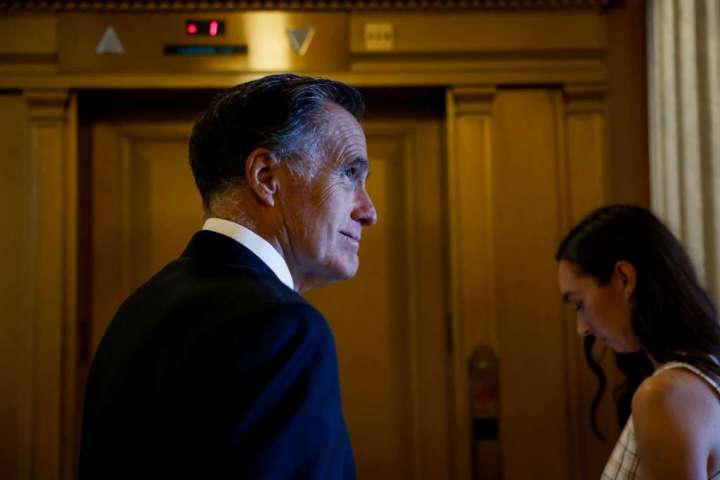Sen. Mitt Romney (R-Utah) is still a Republican, however much Donald Trump and his allies would like to suggest that he isn’t. He released a statement in support of the Supreme Court’s decision to overturn Roe v. Wade. He’s critical of President Biden’s decision-making and Democratic policy positions.
Utah remains the beating heart of GOP Trump skepticism

In an essay for the Atlantic published July 4, Romney renewed his criticism of the former president as he fretted over the country’s future.
The piece is framed broadly as a criticism of both the political left and right. “The left thinks the right is at fault for ignoring climate change and the attacks on our political system,” Romney writes. “The right thinks the left is the problem for ignoring illegal immigration and the national debt.” He adds that “wishful thinking happens across the political spectrum.”
But he later makes clear that one set of concerns is more dire than the other. In what is probably the essay’s most quoted sentence, Romney writes that “a return of Donald Trump would feed the sickness, probably rendering it incurable.”
What struck me about that framing — that reelecting Trump risks the health of the country entirely — is how it overlaps with what happened in the primaries held last month in the state Romney represents. Trump has been vicious in lashing out at those he perceives to have wronged him, including legislators who voted to create the House select committee investigating the Jan. 6, 2021, attack at the Capitol. Yet two Republican Utah legislators who did so, Reps. John Curtis and Blake D. Moore, easily won reelection.
Trump endorsed the reelection bid of Sen. Mike Lee (R-Utah), who will advance to the general election. (Lee, unlike Romney, worked to aid Trump’s effort to overturn Biden’s win in 2020.) There, he won’t face a Democrat but an independent: Evan McMullin, who in 2016 earned a fifth of Utah’s presidential votes — nearly one vote for every two that Trump got.
It’s a reminder that not only is Romney skeptical of Trump, but many Utahns are, too.
In 2000 and 2004, Utah had the widest margin for Republican presidential candidates of any state. That fell in 2008 — not coincidentally when Romney’s bid for the Republican nomination came up short — but rebounded in 2012 when he led the ticket. Utah voted more than 50 points more Republican than the national margin that year.
Then the Trump era arrived. In 2016, Utah voted only about 20 points more Republican than the national margin, below the average of Republican-voting states. In 2020, it voted only slightly above the Republican average.
What happened? It’s complicated, certainly, but some significant part of the skepticism seen in the state derives from religion.
Utah has a high percentage of residents who are members of the Church of Jesus Christ of Latter-day Saints (the name the church prefers to “Mormon”). Of the 10 counties with the highest density of adherents to the religion, according to PRRI’s 2020 census of religion, nine are in Utah. (The 10th is in Idaho.)
From 2000 to 2012, those 10 counties voted Republican by a wider margin than the 10 counties with the highest percentages of White evangelical Protestants. But in 2016, that changed. Those 10 counties still vote more heavily Republican than Republican counties overall, including that rebound in 2020. But as the most evangelical counties shifted dramatically right in 2016, the most-LDS counties shifted back to the left.
In 2016, BuzzFeed’s McKay Coppins explored why Mormons were skeptical of Trump. There were the expected reasons: his affinity for swearing, his, uh, complicated romantic history. But there’s also the history of the church itself.
“The Church of Jesus Christ of Latter-day Saints is neutral in regard to party politics and election campaigns. However, it is not neutral in relation to religious freedom,” a statement from the church stated in response to Trump’s call to ban Muslim immigration to the United States. The LDS church, after all, was a target of violent discrimination for decades, a history that lingers.
During his presidency, Trump and his allies worked to build a better relationship with LDS voters, including dispatching Donald Trump Jr. to Utah so often that some prominent Republicans got “the impression that he may want to convert,” as Coppins reported in 2020. Perhaps he made inroads. But it’s also the case that after a 21 percent of the vote was eaten up by McMullin in 2016, Biden outperformed Hillary Clinton by about 10 points in 2020 and Trump only did 12 points better than he had four years earlier.
After he spoke against Trump’s possible return to power in his new Atlantic essay, Romney criticized congressional leaders for failing to show “backbone” when considering difficult political moments. He is also dismayed at the way in which D.C. often “demonstrates the maxim that for evil to thrive only requires good men to do nothing.”
It’s a reminder that one of those who has decided to look the other way at Trump is the chairwoman of the Republican Party, Ronna McDaniel. Speaking to Politico in 2020, she expressed confidence that “Mormons especially start looking at [Trump] as a different type of candidate than they did in 2016 because now he has a record.” In the wake of Trump’s loss, she did little to thwart his effort to retain his position.
McDaniel could speak to how LDS voters viewed Trump, though: She is a member of the church. And she might feel a bit more sting from Mitt Romney’s criticism of weak-kneed leaders than others: She is his niece.






